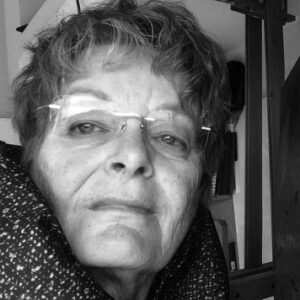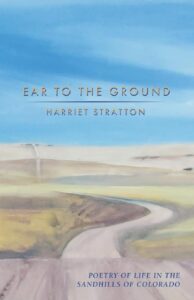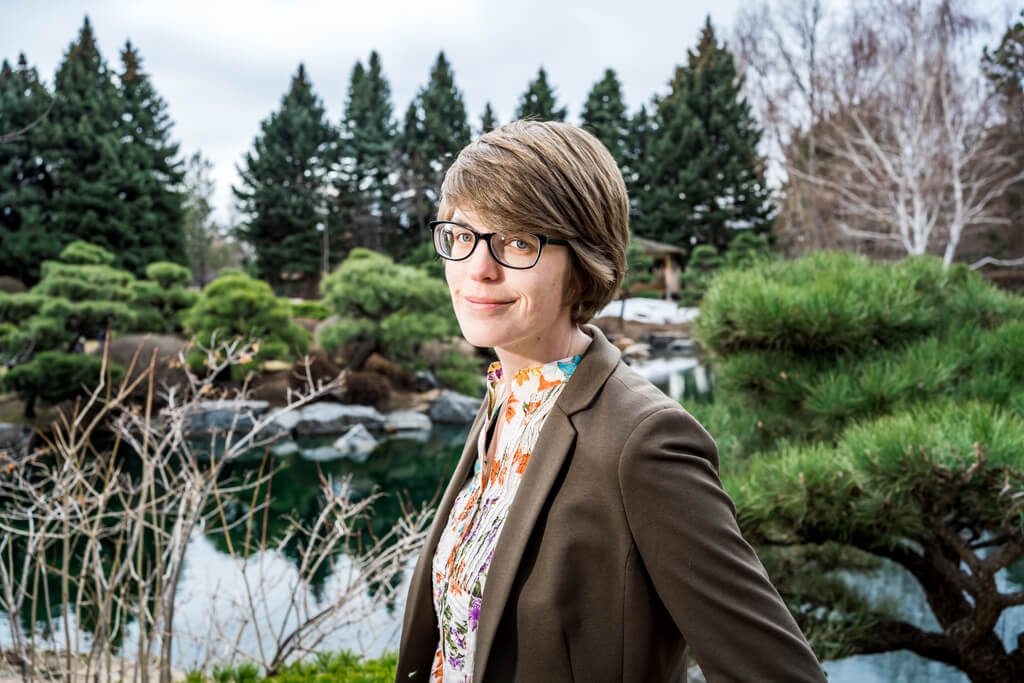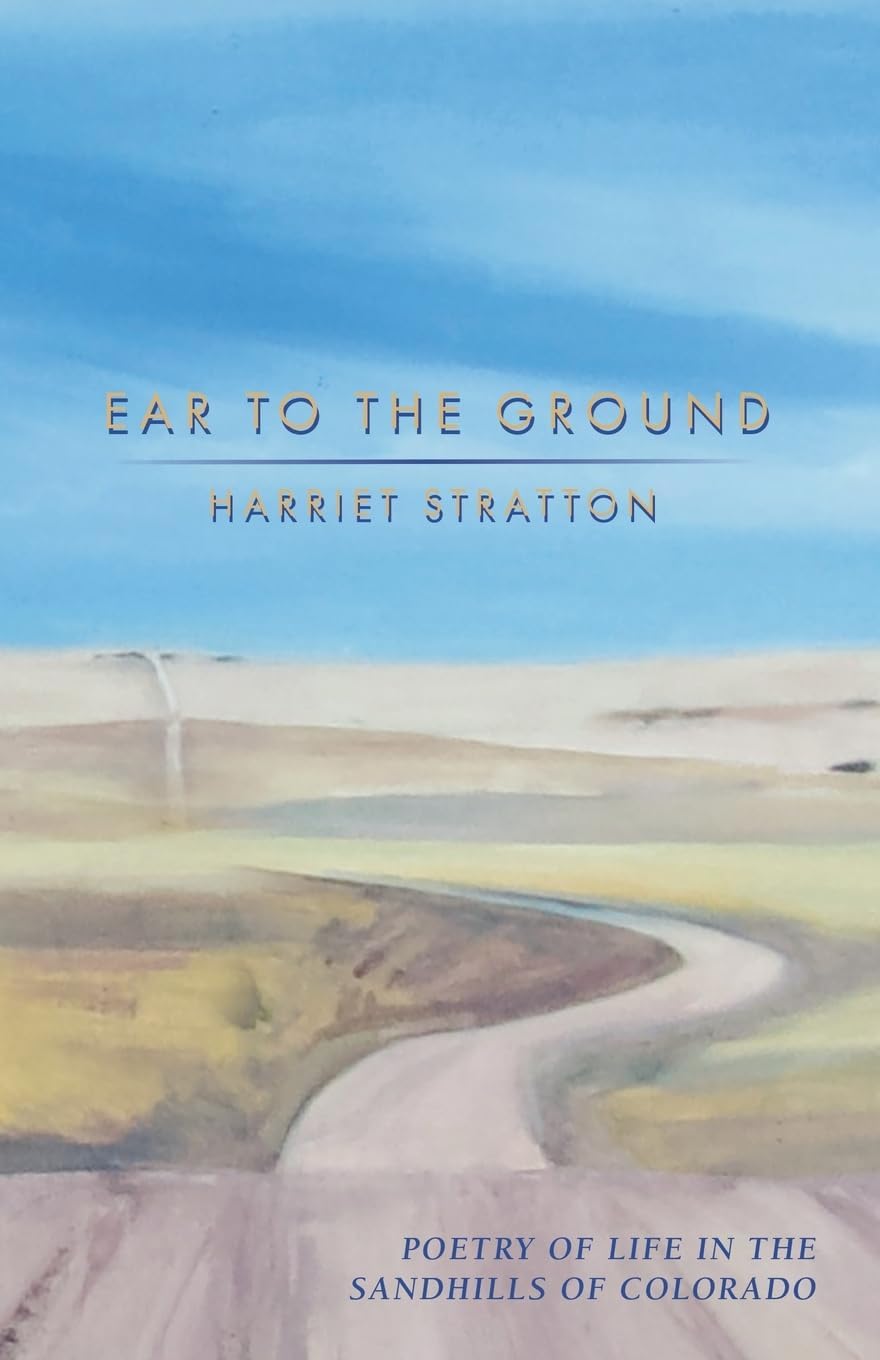‘Some tips on remembering’*
An interview with poet Harriet Stratton, introducing her debut chapbook Ear to the Ground
An interview with poet Harriet Stratton, introducing her debut chapbook Ear to the Ground
Harriet Stratton is a Colorado poet who currently lives on the Front Range of the Rocky Mountains. For many years, she has been a member of Lighthouse Writers Workshop in Denver, and her poetry has been previously published by The Colorado Independent, Global Poemic and Anhinga Press, which nominated her selection in their anthology for a Pushcart Prize. (You can read the first two poems here and here, and the Anhinga anthology is available for purchase here.)

Harriet Stratton
Stratton’s debut chapbook, Ear to the Ground:Poetry of Life in the Sandhills of Colorado, was published in 2024 by Finishing Line Press, and it describes her early years growing up on a ranch in northeastern Colorado. This slim book is full of reflection and solitude, but don’t be fooled. Within the shifting prairie grass of these poems, there is also fear and hurt and rage. In this chapbook, Statton worries at the line between living and dying; she dissects both the act of remembering and the memories themselves. The result is a lovely account of a childhood long gone, a coming-of-age wholly unlike that of today.
I read Ear to the Ground through the lens of inquiry. I knew I would have the opportunity to learn more about the work from the poet herself, and I kept an eye out for moments and themes that would be interesting to explore. However, as I read through the chapbook, I realized there was simply too much to ask about. I wanted to know more about her day-to-day life, about her relationships with her siblings, her education, her tasks on the ranch, the animals she raised, everything.
In the end, I decided to ground the interview in the poems themselves. I selected three that embody different elements of Stratton’s childhood; each is a grounded moment in time from which we can explore complex issues and experiences.
Ear to the Ground gives the reader a chance to experience a specific time and place, to consider the malleable shape of a life—and in that consideration, to better understand our own growth, our own connections to the places and people around us. Heartfelt thanks to Harriet Stratton for sharing her life through her poetry and for answering my questions with candor and care.
Poem 1
“While Making Fence with My Father”
I carry the red Hills Bro coffee can
of u-shaped fence staples which he picks
to nail bared wire to each creosote post.
On the tailgate, we eat a sandwich.
He uncorks his thermos, I kneel in the sand
sifting silk through nine-year-old fingers.
That’s how I find a tiny shell—so far
from any sea. I raise it to my father’s smile.
He sweeps an arm across the prairie…
This was all underwater—far as you can see.
You’re sitting at the far edge of history—
on the bed of a great ancient sea.
Something stirred in me then, like a root
reaching a depth below time. I think
I began to feel how it is to think…
as if a camera that had focused on me
backed away and through the lens, young dad
and the blue pickup appeared as an island
in the endless waves of grass… and I,
but a grain on the shore of the familiar…
lapped by an ocean of all there is yet to know.
MH: Will you tell us more about what it was like growing up as a girl on a ranch? What was expected of you?
HS: Growing up on the 5 Lazy S Ranch (our brand) was all about doing the necessary work. I steered the hay truck through the cow pasture (while Dad kicked a trail of broken hay bales off the back) before my feet could reach the pedals. He just put the truck in ‘grandma’ (the lowest gear) and slipped out the driver side door while I slid over to take the wheel. Keep us out of the ruts, he warned. Never mind that I couldn’t see over the dashboard.
My driving career had only begun—I went on to drive summer fallow tractors, alfalfa swathers, and silage trucks all before my driver’s license test.
But beyond machinery, ranch life also put me in touch with animals—my chickens, our milk cow, the family dog—with whom I became friends. I love the landscape on which we all lived and the wild ones that surrounded us (coyotes, deer and antelope, hawks and larks). I learned to herd cattle, gentle horses, husband prairie grass. I learned to trust, help and depend on my community of neighbors.
I became friends. I love the landscape on which we all lived and the wild ones that surrounded us (coyotes, deer and antelope, hawks and larks). I learned to herd cattle, gentle horses, husband prairie grass. I learned to trust, help and depend on my community of neighbors.
Poem 2
“Sweet Sixteen Birthday Present”
It was a saddle
displayed on its tree in the living room
red bow stuck on the horn;
the leather cantle carved with roses
marked it as a seat for a woman
or a girl who once loved horses.
But I liked to ride bareback. Always had.
The buckles gleamed;
the glint of what dangled made it seem
as if the saddle had been delivered
to cinch me down, tame me, break
the wild blue horse inside
that someday soon would fly me away.
MH: How did your relationship with nature change as you got older?
HS: Through my writing I felt the need to explore the place this ranch occupied in my life, in my imagination. That led to questions of memory: Why are some so persistent? What happens to memories when the main memory carrier passes? Where, in the body, do they lodge? We carry memories of the landscape; does the landscape store memories of, and even for, us?
Depictions of ranch life are often rugged, raw, and gritty. I wanted to focus on feelings, lift emotions to the horizon of poetry. Poetry that could match the interior landscape I carry within today. […]
My relationship with nature, developed on the ranch, remains a cherished touchstone. It has led and fed my curiosity over the years (dedicated birder, formerly on the Board of Directors, Denver Audubon) and provides wisdom, comfort in its beauty, and endless recreational enjoyment. Of course, also chagrin. Habitat loss, commercial development, reckless resource extraction, etc.
Poem 3
“Drawing from Memory”
[…]Mother remembers bundling sheaves into shocks
with her father, still talks of the flood of ‘38’—
how the water rose as they hurried hens and chicks
and the collie up the steep ladder to the loft—
how the sweet smell of milk cows and hay sailed
them through that wet weeping sleep like an ark.
Found memories, I’ll keep safe when I re-mark
the long brown sound of that receding river—
wild asparagus rocketing up through the dark.
MH: We learn a lot about your relationship with your father throughout these poems, but not as much about your relationship with your mother. What was your mother like, and how did she influence your understanding of womanhood?
HS: It is still difficult to write of the role my dear mother played in this saga. She died very demented, age 98, a year ago. Only now am I beginning to rise above the difficulties of those final years and explore in writing the truth of her influence. Simply said: It was great.
* “Some Tips on Remembering” is the title of a poem in Stratton’s chapbook, Ear to the Ground.
While Marissa Harwood was born in Omaha, Nebraska, she moved to Colorado when she was four days old and considers herself a native. She grew up in the shadow of the Rocky Mountains and spent much of her childhood camping, hiking and building forts in the woods. She earned a BA in English and a Secondary Teaching License from the University of Colorado at Boulder. Later, she attended Western Colorado University and earned an MFA in genre fiction. She has taught English at three K-12 schools and two Colorado colleges. Currently, she lives in Greeley, where she teaches high school, plays with her daughter (a true CO native) and reads a lot of books. She hopes to earn a doctorate in the near future.
Click here for more from Marissa Harwood.

